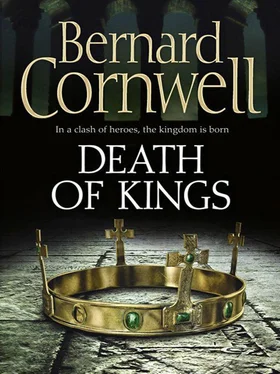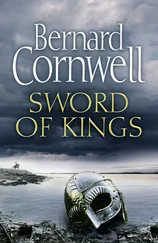‘Kill and wound!’ I shouted. ‘Kill and wound!’
Broga, the name meant terror, leaped forward. All along the wood’s edge the horsemen appeared, blades gleaming, and we charged at the scattered Danes, shouting, and the world was the drumbeat of hooves.
Most Danes turned to flee. The sensible ones kept charging towards us, knowing that their best chance of survival lay in crashing through our ranks and escaping behind us. My shield banged on my back, Serpent-Breath was raised, and I swerved towards a man on a grey horse and saw him ready to swing his sword at me, but one of Æthelflaed’s men speared him first, and he twisted in the saddle, sword falling, and I left him behind and caught up with a Dane fleeing on foot and slammed Serpent-Breath across his shoulders, drew her back along his neck, saw him stagger, left him, swung the sword at a running man and laid his scalp open so that his long hair was suddenly wet with blood.
The dismounted Danes by the hall had made a shield wall, perhaps forty or fifty men who faced us with their round shields overlapping, but Finan had turned and brought his men back, savaging his way up the road and leaving bodies behind him and he now brought his men behind the shield wall. He screamed his Irish challenge, words that meant nothing to any of us, but curdled the blood all the same, and the shield wall, seeing horsemen in front and behind, broke apart. Their captives were cowering in the yard, all women and children, and I shouted at them to head north towards the river. ‘Go, go!’ Broga had charged two men. One swung his sword at Broga’s mouth, but he was trained well and reared up, hooves flailing, and the man ducked away. I clung to him, waited till he came down and brought Serpent-Breath hard down onto the second man’s head, splitting helmet and skull. I heard a scream and saw that Broga had bitten off the first man’s face. I spurred on. Dogs were howling, children screaming, and Serpent-Breath was feeding. A naked woman stumbled from the hall, her hair unbound, her face smeared with blood. ‘Go that way!’ I shouted at her, pointing my red blade north.
‘My children!’
‘Find them! Go!’
A Dane came from the hall, sword in hand, stared in horror and turned back, but Rypere had seen him and galloped by him, seized him by his long hair and dragged him away. Two spears gouged his belly and a stallion trampled him and he writhed, bloody and moaning and we left him there.
‘Oswi!’ I shouted for my servant. ‘Horn!’
More Danes were showing in the south now, many more Danes, and it was time to go. We had hurt the enemy badly, but this was no place to fight against an outnumbering horde. I just wanted the Danes to stay here, trapped by the river, so that Edward could bring the army of Wessex against them and drive them like cattle onto my swords. Oswi kept sounding the horn, the noise frantic.
‘Back!’ I shouted. ‘All of you! Back!’
We went back slowly enough. Our wild charge had killed and wounded at least a hundred men so that the small fields were dotted with bodies. The injured lay in ditches or by hedges, and we left them there. Steapa was grinning, a fearsome sight, his big teeth bared and his sword reddened. ‘Your men are the rearguard,’ I told him, and he nodded. I looked for Æthelflaed and was relieved to see her unharmed. ‘Look after the fugitives,’ I told her. The escaped captives had to be shepherded back. I saw the naked woman dragging two small children by their hands.
I formed my men at the edge of the trees where our charge had started. We waited there, shields on our arms now, swords bright with enemy blood, and we dared the Danes to come at us, but they were disorganised and they were hurt, and they would not risk a charge until they had more men, and once I saw that the fugitives were safely gone north I shouted at my men to follow them.
We had lost five men; two Mercians and three West Saxons, but we had savaged the enemy. Finan had two captives, and I sent them ahead with the fugitives. The bridge was crowded with horses and fleeing people, and I stayed with Steapa, guarding the southern end until I was certain the last of our people was across the river.
We barricaded the northern end of the bridge, heaping logs across the road and inviting the Danes to come and be killed between the Roman parapets. But none did. They watched us work, they gathered in ever greater numbers on the West Saxon side of the river, but they did not come for their revenge. I left Steapa and his men to guard the barricade, certain that no Dane would cross while he was there.
Then I went to question the captives.
The two Danes were being guarded by six of Æthelflaed’s Mercians, who protected them from the fury of a crowd that had gathered in the space before Saint Werburgh’s convent. The crowd fell silent when I arrived, cowed perhaps by Broga whose mouth was still stained with blood. I slid from the saddle and let Oswi take the reins. I still carried Serpent-Breath in my hand, her blade unwashed.
There was a tavern hung with the sign of a goose next to the convent and I had the two men taken into its yard. Their names were Leif and Hakon, both were young, both were frightened and both were trying not to show it. I had the yard gates closed and barred. The two stood in the yard’s centre, surrounded by six of us. Leif, who did not look a day over sixteen, could not take his eyes from Serpent-Breath’s blood-caked blade. ‘You have a choice,’ I told the pair. ‘You can answer my questions and you’ll die with swords in your hands, or you can be obstinate and I’ll strip you both naked and throw you to the folk outside. First, who is your lord?’
‘I serve Jarl Cnut,’ Leif said.
‘And I serve King Eohric,’ Hakon said, his voice so low I almost could not hear him. He was a sturdy, long-faced boy with straw-coloured hair. He wore an old mail coat, ripped at the elbows and too big for him and I suspected it had been his father’s. He also wore a cross about his neck, while Leif had a hammer.
‘Who commands your army?’ I asked them.
They both hesitated. ‘King Eohric?’ Hakon suggested, but he did not sound sure.
‘Jarl Sigurd and Jarl Cnut,’ Leif said, just as uncertainly and almost at the same moment.
And that explained a great deal, I thought. ‘Not Æthelwold?’ I asked.
‘Him too, lord,’ Leif said. He was trembling.
‘Is Beortsig with the army?’
‘Yes, lord, but he serves Jarl Sigurd.’
‘And Jarl Haesten serves Jarl Cnut?’
‘He does, lord,’ Hakon said. Æthelflaed was right, I thought. Too many masters, and no one man in command. Eohric was weak, but he was proud, and he would not be subservient to Sigurd or Cnut, while those two probably despised Eohric, yet had to treat him as a king if they were to have his troops. ‘And how big is the army?’ I asked.
Neither of them knew. Leif thought it was ten thousand strong, which was ludicrous, while Hakon just said they had been assured it was the largest army ever to attack the Saxons. ‘And where is it going?’ I asked.
Again neither knew. They had been told that they would make Æthelwold the King of Wessex and Beortsig the King of Mercia, and those two monarchs would reward them with land, but when I asked if they were going to Wintanceaster they both looked blank and I realised neither had even heard of that city.
I let Finan kill Leif. He died bravely and swiftly, a sword in his hand, but Hakon begged to see a priest before he died. ‘You’re a Dane,’ I told him.
‘And a Christian, lord.’
‘Does no one worship Odin in East Anglia?’
‘Some, lord, but not many.’
That was worrying. Some Danes, I knew, converted because it was convenient. Haesten had insisted his wife and daughters were baptised, but that was only because it yielded better terms from Alfred, though if Offa had not lied about everything before he died then Haesten’s wife was a true believer. These days, as I face my own death and my old age dims the glories of this world, I see nothing but Christians. Perhaps in the far north where the ice grips the summer land there are some folk left who sacrifice to Thor, Odin and Freya, but I know of none in Britain. We slide into darkness, towards the final chaos of Ragnarok, when the seas will burn in turmoil and the land will break and even the gods will die. Hakon did not care whether he held a sword or not, he just wanted to say his prayers, and when they were said we took his head from his shoulders.
Читать дальше
Конец ознакомительного отрывка
Купить книгу












